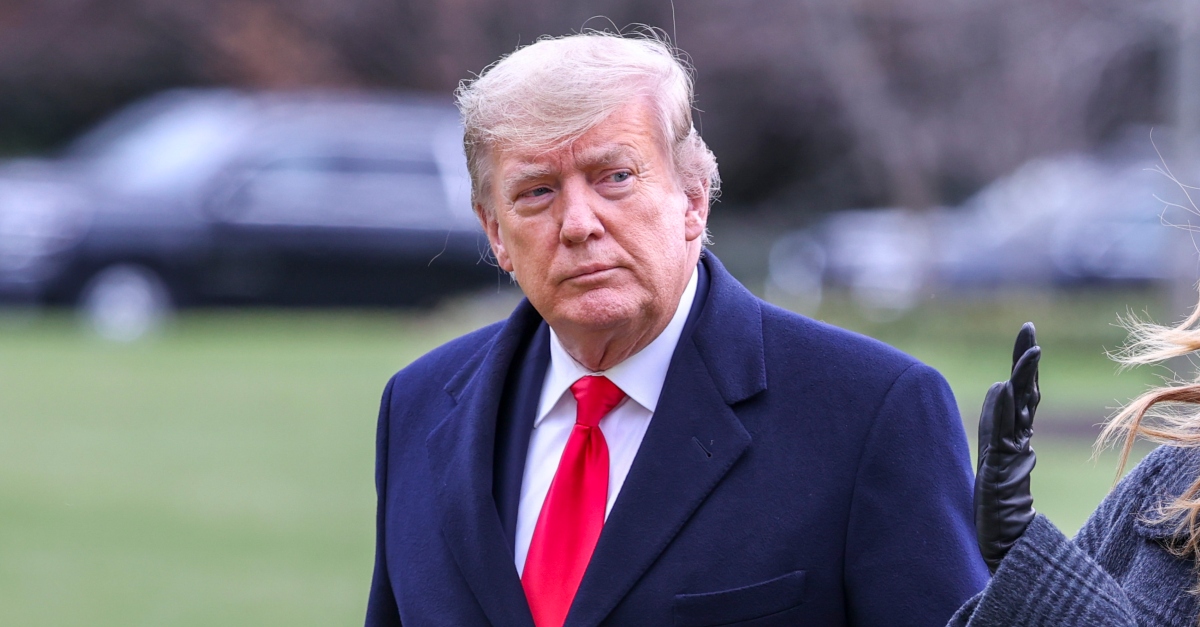
Nearly all Republican members of the Senate on Tuesday went on the record to opine that the impeachment of a former president violates the U.S. Constitution, sending a strong signal that, similar to last year, Donald Trump will likely be acquitted following next month’s trial. Some legal experts believe, however, that even if the Senate ultimately decides in Trump’s favor, the impending trial is likely to produce new evidence against the former president that will increase the chances he will face criminal charges.
In a 55-45 vote, the chamber voted down Sen. Rand Paul’s (R-Ky.) point of order objecting to the articles of impeachment alleging that Trump incited an insurrection on the U.S. Capitol earlier this month. 45 of 50 Republican senators voted that the impeachment was unconstitutional. Only Sens. Mitt Romney (R-Utah), Ben Sasse (R-Neb.), Susan Collins (R-Maine), Lisa Murkowski (R-Alaska) and the retiring Pat Toomey (R-Pa.) voted with Democrats to table Paul’s objection.
Just prior to the vote, Paul told his colleagues that he knew the resolution would not pass, but he said the purpose of the vote was to force lawmakers to go on the record one way or the other.
“If we are going to put every politician in jail, are we going to impeach every politician who has used the words ‘fight’ figuratively in a speech? Shame,” the Kentucky senator said, adding that Democrats were “deranged by their hatred” of the former president. “I want this body on record. Every last person here.”
Paul’s attempt to get the Senate to decide what is and is not constitutional is governmentally backwards, but it’s at least consistent with his other views on government powers. Generally speaking, the Senate’s job is to make all laws necessary and proper and to tax and spend for the general welfare. (The Senate has other tasks, such as conducting impeachment trials, counting electoral votes, etc.) It’s the Supreme Court’s job to decide what is and is not constitutional, but Paul erroneously claimed that was not the case in 2012. Back then, he received considerable blowback from legal scholars for statements about Chief Justice John Roberts‘ famous interpretation of individual mandate in Obamacare as a tax.
“Just because a couple people on the Supreme Court declare something to be ‘constitutional’ does not make it so,” Paul said back then. Now, he apparently thinks it’s the Senate’s job to decide when something is or is not constitutional.
The vote regarding Trump’s upcoming trial came after Republicans on Tuesday morning met with conservative George Washington University Law School professor Jonathan Turley, who’s advocated for the position that the Constitution proscribes impeachments of former officials, despite ample precedent to the contrary.
The position of the majority of Republicans, which argues the proceeding is pointless, also suggests that lame-duck presidents are essentially not bound by the laws designed to constrain them.
But legal experts pointed out that even with acquittal seemingly inevitable, the trial itself could spell trouble for Trump.
“Seems clear we are barreling toward a Not Guilty verdict for Trump (again),” wrote attorney Ross Garber, an expert in political impeachments. “Other paths to consider: extensive discovery, including subpoenas for info and depositions to reveal more of what he knew and did [and] a censure resolution + oversight hearings.”
Discovery would presumably seek to learn not just what Trump knew and thought before the violence (e.g., Did he really believe what he was saying about election fraud? What was his intent or expectation for Jan. 6? What about the Brad Raffensperger phone call from days before?). Witness testimony and documents could also focus on what Trump did or failed to do in the minutes, hours and days after the Capitol attack.
The Capitol siege of Jan. 6 occurred immediately after Trump and his allies 1) falsely told supporters at a rally that the 2020 election was stolen from them and 2) told them that they wouldn’t have a country anymore unless they fought like hell. But the violence was the culmination of months of litigating and failing in courts at every level of the federal court system and in each state where the Trump campaign and its allies attempted to challenge and overturn the results. They succeeded in the court of the loyal Trump supporter’s opinion by asserting that a steal needed to be stopped on Jan. 6.
Minnesota-based attorney Albert Goins similarly cautioned against dismissing the legal troubles Trump is facing.
“Do not discount the value of an impeachment trial to establish a record that can be used as a resource to prosecute a former president who obtains no double jeopardy protection from having been subject to impeachment,” he wrote. “We will shortly learn how strong that evidence may be.”
https://twitter.com/ALBERTTGOINS1/status/1354177403631919104?s=20
Taking it a step farther, CNN legal analyst and former federal prosecutor Elie Honig said a Senate acquittal may provide increased motivation for prosecutors to go after the former president.
“Let me get this logic, according to Senators who claim you can’t try an ex-president: If you succeed in stealing an election and holding onto power, then you can be impeached. But if you try and fail, then you’re in the clear,” he wrote. “If the Senate acquits Trump largely on the (suspect) legal view that you can’t try a former official, that increases the impetus on prosecutors to take action. Otherwise there will be no substantive hearing, and no consequence, for Trump’s actual conduct.”
Several defense attorneys who represent those arrested at the U.S. Capitol Siege on Jan. 6 have said their clients acted specifically because they believed Trump told them to do so.
Aaron Keller contributed to this report.
[image via Tasos Katopodis/Getty Images]
Have a tip we should know? [email protected]